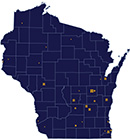Search Results
Your search returned 0 categories and 17 Links.
-
Still Not Free When They Come Home: How Wisconsin's Criminal Legal System Harms Democracy and the Black Community on Milwaukee's North Side Center for Popular Democracy and BLOC, October, 2023“People released from prison did not know that their voting rights are restored after completing their sentences, received disinformation telling them they were ineligible to vote, or were too overwhelmed...to figure out voting right away.”
-
Forgotten but not gone: A multi-state analysis of modern-day debt imprisonment Johann D. Gaebler et al, September, 2023“Between 2005 and 2018, around 38,000 residents of Texas and around 8,000 residents of Wisconsin were jailed each year for failure to pay (FTP), with the median individual spending one day in jail in both Texas and Wisconsin.”
-
The Power and Problem of Criminal Justice Data: A Twenty-State Review Measures for Justice, January, 2023“The problem is, [pretrial and bail] data rarely exist, especially in court records. Of the twenty states we collected data from, only two, Wisconsin and Pennsylvania, had data on pretrial practices, and these were limited at best.”
-
Does Public Health Start Within Jails? A New Incentive for Reform of Wisconsin's Bail System Mahmood N. Abdellatif, July, 2022“There is a growing impetus for states like Wisconsin to reduce their incarcerated populations by enacting sensible bail reforms that effectively consider a detainee's real threat to their communities or likelihood to abscond.”
-
Revoked: How Probation and Parole Feed Mass Incarceration in the United States Human Rights Watch & the ACLU, July, 2020“The most common rule violations that trigger incarceration in Wisconsin are using drugs and consuming alcohol or entering bars. In Pennsylvania, state parole violations largely result from people failing to report address changes and using drugs.”
-
The Wisconsin Community Corrections Story Columbia University Justice Lab, January, 2019“Wisconsin serves as a good example of a place where parole and probation supervision are contributing to a prison population that is highly racially disparate and growing.”
-
Excessive Revocations in Wisconsin: The Health Impacts of Locking People Up without a New Conviction Human Impact Partners, December, 2016“Revocation -- being incarcerated for breaking the rules of a supervision arrangement (like parole, probation, or extended supervision) -- feeds the mass incarceration cycle in the United States.”
-
Key findings from statewide surveys in Florida, North Carolina, Nevada, Kentucky, Missouri, and Wisconsin Justice Action Network; The Tarrance Group, February, 2016“[T]here is broad consensus that the federal criminal justice system jails too many non-violent criminals and spends too much on jailing nonviolent offenders.”
-
Prison Price Tag: The High Cost of Wisconsin's Corrections Policies Wisconsin Budget Project, November, 2015“Wisconsin state and local governments spend about $1.5 billion on corrections each year, significantly more than the national average given the size of our state.”
-
Do Private Prisons Distort Justice? Evidence on Time Served and Recidivism University of Wisconsin - Madison, March, 2015“My final result is that there is no reduction in recidivism for prisoners in private prison despite the additional time they serve, suggesting that either the marginal returns to incarceration are low, or private prisons increase recidivism risk.”
-
2014 WI Prison End-of-Year Population Snapshot on 12/31/2014 Wisconsin Department of Corrections, March, 2015(The overall population increased 8.9% from 2000 to 2014.)
-
Wisconsin's Mass Incarceration of African American Males: Workforce Challenges for 2013 Employment and Training Institute, University of Wisconsin, April, 2013“From 1990 to 2011 Wisconsin incarcerated 26,222 African American men from Milwaukee County in state correctional facilities. As of January 2012, 20,591 men had been released back into the community and 5,631 were still imprisoned.”
-
 Importing Constituents: Prisoners and Political Clout in Wisconsin Prison Policy Initiative, March, 2008
Importing Constituents: Prisoners and Political Clout in Wisconsin Prison Policy Initiative, March, 2008
-
Barriers to Employment: Prison Time Employment and Training Institute, University of Wisconsin-Milwaukee, 2007“The stigma of being an ex-inmate alone and the limitations it places on those released and expected to become gainfully employed are compounded by further legal sanctions placed on those who have spent time in correctional facilities.”
-
Treatment Instead of Prisons: A Roadmap for Sentencing and Correctional Policy in Wisconsin Justice Strategies, January, 2006“Absent a major investment of tax dollars in treatment services, however, we found that the state is likely to face mounting prison populations pressures in coming years due to growth in nonviolent admissions and revocations of post-release supervision.”
-
Judicial Response to Proposed Substance Abuse Treatment Leg. in Wisc. Results of Three Focus Groups Wisconsin Sentencing Commission, March, 2005
-
Wisconsin Racial Disparities in Criminal Justice Project Professor Pamela Oliver University of Wisconsin Department of Sociology, 2002
Pages Updated On: 14-Apr-2025 - 06:40:34
Links Engine Powered By: Gossamer Threads Inc.
 Importing Constituents: Prisoners and Political Clout in Wisconsin Prison Policy Initiative, March, 2008
Importing Constituents: Prisoners and Political Clout in Wisconsin Prison Policy Initiative, March, 2008